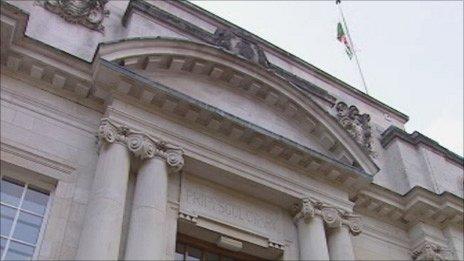Uni of Wales needs 'decent burial' - Leighton Andrews
- Published

The University of Wales had 'let Wales down' said the minister
The University of Wales (UoW) requires "a decent burial" following a turbulent period which has damaged the reputation of Wales, says the education minister.
Leighton Andrews told BBC Wales the university had "let Wales down".
His comments followed news that another university in Wales - University of Wales Institute, Cardiff (Uwic) - wanted to deliver its own degrees.
Wrexham's Glyndwr University and University of Wales, Newport, have already announced similar plans.
It follows a BBC Wales investigation into a student visa scam at colleges offering UoW-validated qualifications.
Mr Andrews told BBC Radio Wales: "I think the University of Wales probably requires a decent burial.
'Let Wales down'
"I made a statement in the assembly earlier this week which made it clear that the Welsh government is very concerned about the University of Wales and the damage it is causing to the reputation both of higher education in Wales, and of our country around the world.
"There is, of course, nothing wrong with the University of Wales degree properly awarded. I have a University of Wales degree, so does the first minister, so do many assembly members.
"But I think what has happened over the last 12 months is deplorable and as I said before on this programme, the University of Wales has let Wales down."
Uwic said in an email sent to staff and students that it would be changing its name to Cardiff Metropolitan University and wanted its own degree-awarding powers.
Barbara Wilding, chair of Uwic's board of governors, said: "The board of governors has determined that there is a pressing need to now invoke our own degree awarding powers and to adopt the new name, thereby signalling nationally and internationally our departure from the University of Wales.
'Integral to city'
"Having a name which features the city more prominently will significantly help maintain the profile of Cardiff as a capital city of learning.
"This university has been integral to the city since 1865.
"We look forward to a bright future under the new Cardiff Metropolitan University name as a strong, student-centred university focused on the economic, social and cultural well-being of Cardiff and south east Wales."
Uwic said last week it would not be part of a proposed super-university in south east Wales.
It decided not to merge with the University of Wales, Newport and the University of Glamorgan.
'Highly likely'
Eleven thousand students from more than 125 countries, attend Uwic which offers over 100 undergraduate course.
Prof Deian Hopkin, a former university vice-chancellor, said: "What we're now seeing is an unravelling of some of the great plans for a new University of Wales which was going to encompass a number of institutions. That clearly is no longer an option.
"If Uwic becomes Cardiff Metropolitan University, does that suggest that it's going to be going on its own completely?
"That seems to run slightly counter to the minister's aspiration to have fewer universities in Wales."
Uwic's decision to award its own degrees follows a turbulent week for the University of Wales.
Glyndwr University has already announced it is pulling out of University of Wales degrees while Newport University said it was "highly likely" to deliver its own degrees in the future.
An investigation by BBC Wales' Week In Week Out programme found overseas students were being made offers to cheat their way to UoW-validated degrees and UK graduate work visas.
'Tarnished' brand
The UK Border Agency (UKBA) later raided premises as part of an operation launched in response to the revelations.
The heads of five Welsh universities - Aberystwyth, Bangor, Cardiff, Glamorgan and Swansea - have said they want the UoW title scrapped.
But UoW vice-chancellor Prof Medwin Hughes has said he wants to repair the institution's "tarnished" brand, rather than ditch it.
On Monday, Education Minister Leighton Andrews said the chairman of the UoW council D Hugh Thomas should resign.
Then it was announced a hi-tech scholarship programme run by UoW was to close after ministers decided to withdraw its European funding.
A review found "management and governance shortcomings".
- Published12 October 2011
- Published11 October 2011
- Published7 October 2011
- Published6 October 2011
- Published6 October 2011
- Published5 October 2011
- Published5 October 2011
- Published6 October 2011
- Published5 October 2011
- Published5 October 2011
- Published4 October 2011
- Published3 October 2011
- Published23 September 2011
- Published22 June 2011
- Published6 July 2011